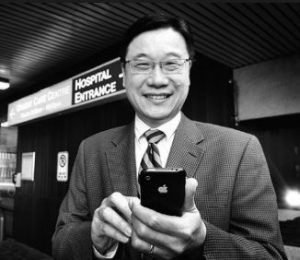


- Challenge: Overcoming hesitation when creating a Twitter account
Solution: Understanding that the information one gets from Twitter is truly worth the time investment - Challenge: Acknowledging Twitter may be daunting for a new user given its time commitment
Solution: Understanding the time one invests will be rewarded with increased research opportunities, research updates, and a broader research network - Challenge: Learning the etiquette of social media
Solution: Begin by observing how others use Twitter to learn more about features Twitter offers
One of Twitter’s greatest advantages is that users are able to read their tailor-made newsfeed from the accounts they have decided to follow, which updates the user on news specific to their research interests. Have you found Twitter has broadened your research interests within the last 6 years?
Given Twitter allows for retweeting, direct messaging, and “liking” of tweets, Dr. Ho has been updated daily on various research topics, which have enhanced his research interests. Twitter allows for each user to tailor their newsfeed in such a way that it contains tweets from accounts the user chooses to follow, therefore regularly updating users on news relating to their interests. Dr. Ho has found connecting with researchers, patients and policy makers through twitter is continuing to assist bridging the gap between research and routine practice.
Could you name a project, event or research study where Twitter has been helpful with disseminating your research? What were some successful strategies you used to help assist this dissemination?
Dr. Ho has found Twitter particularly beneficial for his research in digital health literacy. Not only has Twitter allowed the Digital Emergency Medicine researchers to reach out to research partners and the general public for feedback, it also provides a platform to effectively and efficiently promote their findings, forums and workshops.
Twitter engages its users through multimedia capabilities, such as allowing for the inclusion of photographs within tweets. Dr. Ho has found this to be beneficial for researchers to promote their research, events and newly published articles.
What is some advice you would give new researchers who may be hesitant to join twitter?
Twitter is actively changing and with a significant amount of researchers using Twitter, the best advice Dr. Ho offers for potential new users is to “Jump in!”. For those who are not accustomed to social media platforms, he suggests beginning with just one social media avenue to ease the transition. In addition to this, he suggests finding a mentor who could offer any advice or assistance to guide a new user to avoid feeling overwhelmed.
The WHRI is actively assisting and supporting our members with their research endeavours, including social media support. We are exploring hosting a social media workshop to assist new users who are interested in becoming a Twitter user. If this is something you would be interested in, please contact Nicole.prestley@cw.bc.ca.
